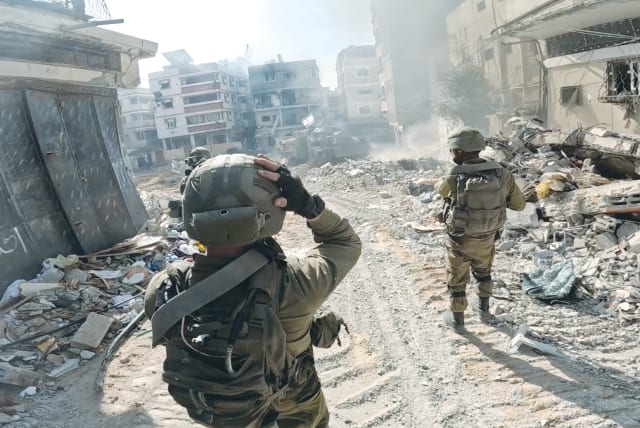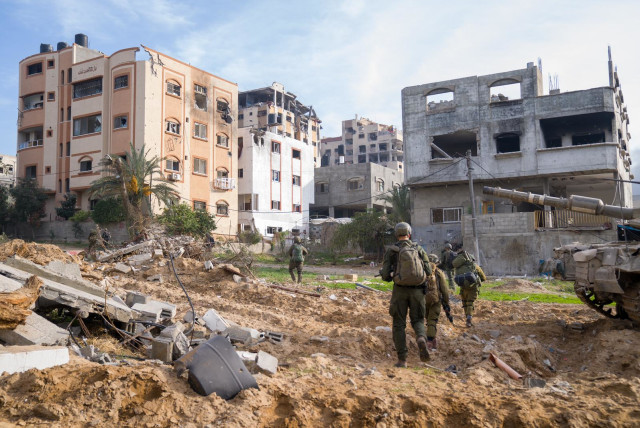A five-step roadmap to Middle East peace - opinion

No matter how many lives will be lost, without tackling the root of the problem, it will all be in vain.
In general, but more so following the October 7 atrocities, perpetrated by Hamas, there is no real go-to entity in the Middle East savvy enough to concoct a sustainable roadmap for the day after the current war.
Israel, immersed in its most urgent objective – winning this no-choice war and destroying Hamas – is seemingly unwilling to openly deal with this issue. In its view, talking about the “day after” may hint to Israel’s enemies that Jerusalem is less than determined to go all the way to the destruction of the military and logistic capabilities of Hamas and the other terrorist entities within the Gaza Strip, and is thus less enthusiastic to do so.
A myriad of Arab countries in the region are pressed by their publics to criticize Israel, while simultaneously being wary of Hamas themselves and of the potential leakage of the unrest into their own borders. Most are awaiting the outcomes of the war. Nobody in the region either respects or wishes to be seen partnering with a losing side.
Certainly, none of the Arab countries “need” a weak Israel with which to cooperate, partner, and coalesce against mutual enemies. Only following a clearcut victory over the terrorist entities within the Gaza Strip, will Israel once more be considered a lucrative partner with which to side against Iran. Hence, rather than adopting a courageous, out-of-the-box stance vis-à-vis the day after the war, the Arab countries prefer to remain on the fence, declaring that an immediate ceasefire is the optimal solution to the current unrest.
The stepping stones of the roadmap
Given the aforementioned lack of enthusiasm by any country in the region to offer any kind of a real – rather than a declarative roadmap to the way that the region should look like following the current war, and given the very negative possibility of this future being dictated to Israel by anyone, without Jerusalem having significant input in the way that it should look, it is key to lay down the very stepping stones of this roadmap right now.
First, Israel is tasked with the destruction of Hamas, in terms of its leadership, military capabilities, as well as its mechanisms of “exporting” its radical ideology within and outside the Gaza Strip. The West Bank, too, needs to be cleared of its terrorist groups, which continue to be armed, trained, and funded by Iran. Likewise, Hamas and other Palestinian terrorist groups must be eradicated in Lebanon.
Second, re-establishing the entire educational system, both in the Gaza Strip and in the West Bank, is required, prior to rebuilding the infrastructure and capacity. All incitement, indoctrination, and hatred must end.
That includes the disintegration of UNRWA, which rather than appease the suffering of Palestinian refugees has been doing the exact opposite for the past 75 years, perpetuating the misery, poverty, and indoctrination of Palestinians. A new forward-looking syllabus and curricula need to be put in place, teaching both religious and secular subjects must be supervised and monitored by external factors.
Third, alongside the creation and enactment of a new educational system, as well as a monitoring mechanism which will make sure that no incitement is practiced, may the actual rebuilding of infrastructure, sustainable sources of income and employment opportunities commence. That is, in a manner which may yet bring hope, rather than more death and destruction, to the Palestinian people and the region as a whole.
Fourth, by no means can the West Bank and the Gaza Strip be seen as one entity. The potential for that had disappeared the day that Hamas had decided to burst the last bubble of hope nurtured by Israelis. Two Palestinian states, both thriving and prosperous and completely independent, yet unarmed and separate, may be established, one in the West Bank and the other in Gaza.
That is, while a coalition of four Western countries govern the Gaza Strip for the first decade, and manage all its civil, logistic, and military aspects. The reason for having three or four such countries, rather than one, temporarily govern the Strip, is to reduce the tremendous weight of this mission from any one particular country. Egypt, not wishing to take that task for itself, despite being offered it many times in the past, may instead be the beneficiary of many of the tenders released for its rebuilding.
Saudi Arabia, UAE, Bahrain
Saudi Arabia, the UAE, and Bahrain may also have an honorary seat at the decision-making table, along with Israel and the aforementioned three-four Western states. For that first decade, Israel will have veto power over the overall security of the Strip, yet the day to day security will be managed by the aforementioned Western powers rather than Israel itself. That is to demonstrate that despite needing to protect its civilians against any such heinous acts as were perpetrated on October 7, Israel has no wish to either take over Gaza, nor does it wish to take upon itself the weight of governing the Palestinians in any manner whatsoever.
The idea is merely to stabilize Gaza and prepare it for self-rule. Following this “cleansing period,” which may take several years and even a decade, a new, non-radical and forward-looking local leadership may begin to formulate. The existing leading families cannot currently be tasked with this leadership. One must also recall the immense internal strife that still characterizes the Palestinian society in the Gaza Strip, as elsewhere – strife which in the past led, and still leads, to internal Palestinian bloodshed.
Finally, and not a tad less important is the simultaneous and immediate establishment of an international coalition against the mastermind of the current havoc we are all witnessing and experiencing in the Middle East – Iran. If that coalition is not established immediately, then the Houthis in Yemen, the Iranian militias in Iraq, those in Syria, Hezbollah and Hamas in Lebanon, Hamas and the Islamic Jihad in the West Bank, and Hamas in Gaza, even after the war, will continue to thrive. No matter how many lives will be lost, without tackling the root of the problem, it will all be in vain.
The writer is a former member of Knesset, served as an adviser to the late president Shimon Peres, and is a past deputy ambassador at the Israeli Embassy in Cairo.
Jerusalem Post Store
`; document.getElementById("linkPremium").innerHTML = cont; var divWithLink = document.getElementById("premium-link"); if (divWithLink !== null && divWithLink !== 'undefined') { divWithLink.style.border = "solid 1px #cb0f3e"; divWithLink.style.textAlign = "center"; divWithLink.style.marginBottom = "15px"; divWithLink.style.marginTop = "15px"; divWithLink.style.width = "100%"; divWithLink.style.backgroundColor = "#122952"; divWithLink.style.color = "#ffffff"; divWithLink.style.lineHeight = "1.5"; } } (function (v, i) { });

